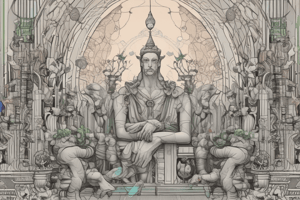Podcast
Questions and Answers
White-collar crimes include robberies and thefts.
White-collar crimes include robberies and thefts.
False (B)
Corporate crime refers to business supplying illegal goods or services.
Corporate crime refers to business supplying illegal goods or services.
False (B)
The rate of violent crime is lower in the US than in Europe.
The rate of violent crime is lower in the US than in Europe.
False (B)
Cities with rapid population growth and poverty show the lowest crime rates.
Cities with rapid population growth and poverty show the lowest crime rates.
Multinational crimes include terrorism, espionage, and bribery.
Multinational crimes include terrorism, espionage, and bribery.
Capital punishment is lowest in China, Iran, North Korea, Saudi Arabia, Yemen, and the USA.
Capital punishment is lowest in China, Iran, North Korea, Saudi Arabia, Yemen, and the USA.
Social control refers to the attempts by individuals to regulate their own thoughts and behavior.
Social control refers to the attempts by individuals to regulate their own thoughts and behavior.
Informal social control involves the criminal justice system.
Informal social control involves the criminal justice system.
Formal social control involves police, courts, and prison officials.
Formal social control involves police, courts, and prison officials.
Serious deviance always involves informal social control.
Serious deviance always involves informal social control.
Flashcards are hidden until you start studying
Study Notes
Deviant Behavior
- Deviant behavior is a violation of existing social norms that is closely related to a particular culture and depends on the times.
- Deviant behavior can be exhibited by a minority or majority, and it's not inherited from biological structures.
Causes of Deviance
- Emile Durkheim attributed deviance to the weakening of social norms, rejection of social norms, and forecast changes in social structure.
- Robert Merton believed that social control cannot control strong biological impulses, and social order is getting weak.
Deviation and Biological Inheritance
- It is not possible to inherit deviant behavior because norms, which are directly related to deviance, cannot be inherited.
- Scientists have not found any biological structures that influence the direction of social behavior.
Symbolic Interactionism and Labeling Theory
- Deviance and conformity result from how others respond to actions, rather than the actions themselves.
- Labeling theory suggests that deviance is defined by society, and who is branded as deviant, and what people decide to do about deviance.
Deviant Subcultures
- Young people cut off from legitimate opportunities often form subcultures that are viewed as deviant.
- Gang subcultures provide a sense of belonging and respect denied by the larger culture.
Crime
- Crime is the violation of a society's enacted criminal law, spanning a wide range from traffic violations to physical abuse and murder.
- Crimes can be categorized into Crimes Against the Person (Violent Crimes), Crimes Against Property (Property Crimes), and Victimless Crimes (Crimes without complaint).
Types of Crime
- Crimes Against the Person include murder, robbery, and physical assault.
- Crimes Against Property include burglary, car theft, and theft of money or property.
- Victimless crimes include violations of law with no obvious victims.
White-Collar Crime, Corporate Crime, and Organized Crime
- White-collar crimes are committed by people of high social position in the course of their occupations, using their powerful offices illegally.
- Corporate crime involves illegal actions of a corporation or people acting on its behalf.
- Organized crime involves business supplying illegal goods or services.
Crime in Global Perspective
- The rate of violent crime is higher in the US than in Europe.
- Countries with low crime rates include India and Japan.
- Cities with rapid population growth and poverty show the highest crime rates.
Punishment in Global Perspective
- Capital punishment is highest in China, Iran, North Korea, Saudi Arabia, Yemen, and the USA.
Social Control
- Social control is an attempt by society to regulate people's thoughts and behavior, often through informal means.
- Formal social control involves the criminal justice system, including police, courts, and prison officials, in response to alleged violations of the law.
Types of Social Control
- Informal social control involves unwritten rules and regulations characterized by informal authority.
- Formal social control involves the criminal justice system.
Studying That Suits You
Use AI to generate personalized quizzes and flashcards to suit your learning preferences.




